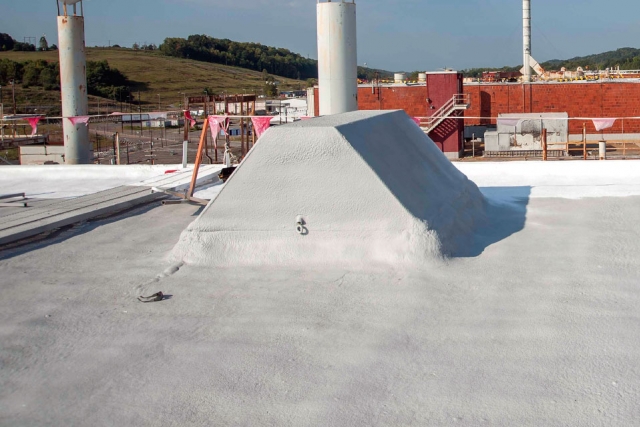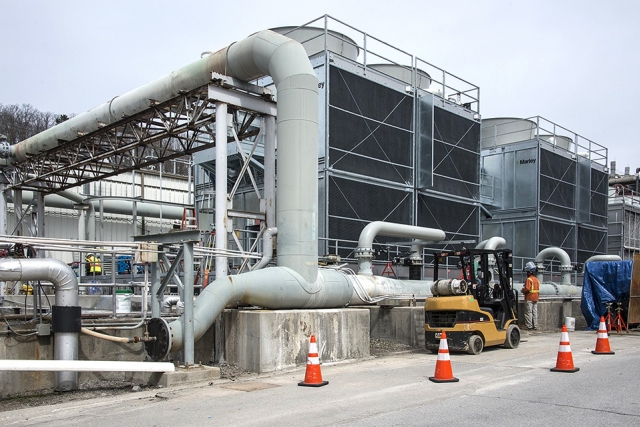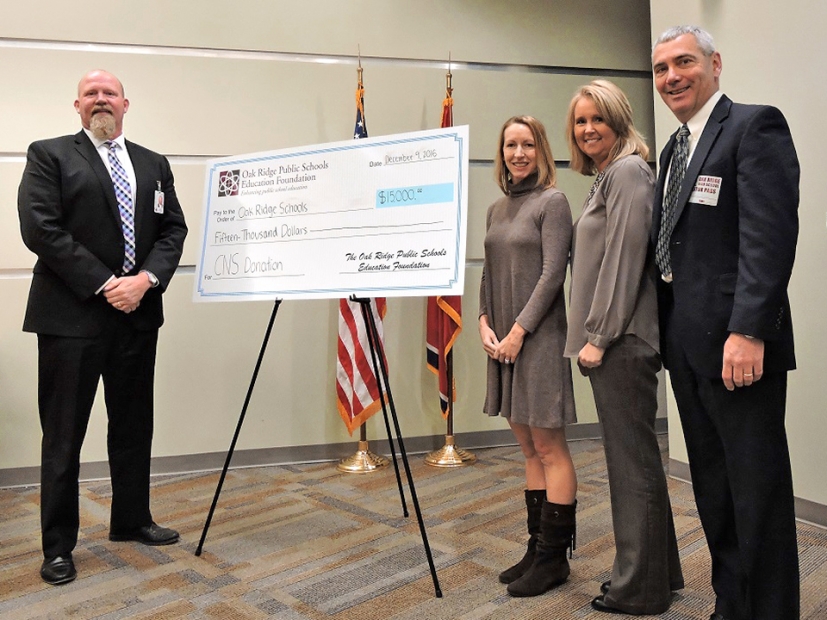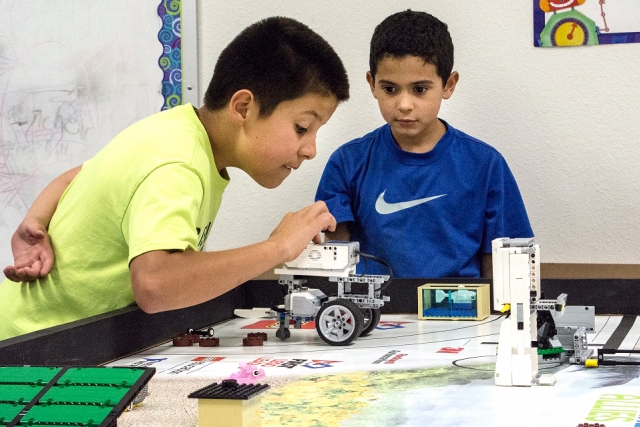Y-12 Blog
Since 2006, Y-12 has been working to address aging facilities that are being used beyond their design life. The Department of Energy (DOE) and the National Nuclear Security Administration (NNSA) recognized Consolidated Nuclear Security’s (CNS’s) efforts as a best practice for its holistic approach to infrastructure.
Jeff Moore of Production Support explained how the Plant Health Review Committee, a key component of the Aging Asset Management Program, identifies asset risks to safe and reliable plant operations and prioritizes associated risk mitigation strategies. Last year, the group achieved a major step forward by fully integrating with the Enterprise Risk Management (ERM) organization to perform asset risk assessments that ultimately drive investment priorities.
Tommy Dodson of ERM said, “The adoption of the ERM process meant applying an established method, using common criteria, and resulting in relevant and reliable risk measures, of which stakeholders could proactively manage.”
Moore said, “Structure, system, and equipment needs are identified through system health reporting and other condition monitoring activities. When needs cannot be addressed by the Facility Health Review Committees, they are escalated as unmitigated risks to the Plant Health Review Committee for funding prioritization.”
Moore worked closely with ERM’s Emily Braswell. “Emily and Jeff devised the most effective means to integrate ERM into the Plant Health work. Emily has stayed an active partner in the committee meetings, ensuring the consistent and continuous application of ERM principles,” Dodson said.
Another component of the Aging Asset Management Program is Y‑12’s Extended Life Program (ELP). Y-12 created the ELP in response to certain capabilities being removed from the Uranium Processing Facility scope, resulting in several production buildings serving an enduring mission after completion of the Uranium Processing Facility.
“Buildings 9204‑2E and 9215 are required to serve an enduring mission,” Moore said. “The ELP leverages the Aging Asset Management Program to evaluate the material condition of these facilities. The ELP includes the additional scope of reviewing regulatory requirements and developing a safety strategy for sustained operations.”
The Y‑12‑established Plant Health Review Committee looks beyond the enriched uranium capability and reviews all required processes and infrastructure at Y‑12. System engineers perform periodic health assessments of key systems.
Moore said, “The greatest success has been creating a plant‑wide forum where asset needs are prioritized holistically with respect to the Y‑12 site. This ensures priorities are identified in an integrated and risk‑informed manner so that out‑year budget requests accurately reflect what is required to sustain Y‑12’s mission capabilities.”
Dodson said, “ERM promotes the uniform evaluation of risks across CNS, which fosters mutual appreciation and informs decision‑making.”
“Being named a best practice affirms the Y‑12 Aging Asset Management Program is a value‑added endeavor and signifies a milestone in programmatic maturity. It is not viewed as recognition of achieving an end‑state but rather a charge to continue advancing,” Moore said.
As a direct result of these advances at Y‑12, CNS, is currently working to stand‑up a Plant Health Review Committee at Pantex to ensure consistency in the risk prioritization process between the two sites.
 Significant prep work was required to seal and frame penetrations at Building Alpha‑5, but the new commercial foam roofing material will result in a significant reduction in facility flooding and water leakage.
Significant prep work was required to seal and frame penetrations at Building Alpha‑5, but the new commercial foam roofing material will result in a significant reduction in facility flooding and water leakage.
A project to install new foam roofs on a trio of excess facilities at Y-12 was recently completed ahead of schedule and under budget, but project officials didn’t stop there.
Initially tasked with re-roofing 280,500-square-feet of roofs on Buildings Alpha-5, Beta-4, and 9206, the project was expanded to include new foam roofs for Buildings 9720-22 and 9768, further protecting Y-12 facilities by preventing leaks, sealing penetrations, stopping the roofs from deteriorating, and protecting the environment.
“We finished ahead of schedule and under budget, and also got new roofs on more buildings that need protecting,” said David Lind, the project manager on the roof replacement projects.
Construction and roofing crews wrapped up the $21 million project in mid-October, a month ahead of schedule and about $2.5 million under budget, even with the addition of Buildings 9720-22 and 9768 — shuttered support buildings for Beta-4 and 9206, respectively. The additional roofing work brought the total coverage to over 300,000 square feet.
Lind emphasized that the project was truly a team effort. The contract was awarded under the National Nuclear Security Administration’s (NNSA’s) Roof Asset Management Program to Indiana-based Insulated Roofing Contractors, but CNS’s construction management and direct-hire support team helped remove equipment and debris from the roofs and handled all of the extensive hoisting and rigging for the project.
Safway Services erected a 74-foot scaffold stair tower providing better access to the roof and allowing more efficient monitoring of uncleared workers. Consolidated Nuclear Security (CNS) Physical Security also worked closely with the project team to better utilize Q-cleared escorts according to building and construction equipment configurations.
“A lot of planning and hard work from a large cross-section of CNS and NNSA organizations is what created this success story,” Lind said.
The new roofs are made of two-to-four inches of polyurethane foam with an elastomeric coating that creates a complete membrane to prevent leaks. They are designed to keep water out of the facilities, (Buildings 9206 and 9768 are still in production use) and maintain electrical systems connected to other areas of Y-12 remain in the facilities.
The buildings will eventually be transferred to the Office of Environmental Management and torn down, but a significant amount of work goes into removing hazards from the facilities before they’re turned over to the Office of Environmental Management.
“Taking a $21 million project from planning through completion in just nine months shows our customer how much we can achieve, and it’s good to know these buildings are protected,” Lind said.
 Y-12 has taken advantage of the energy-saving funding opportunities provided by Energy Savings Performance Contracts and has implemented diverse energy improvement projects, such as new high-efficiency cooling towers for the chiller plant.
Y-12 has taken advantage of the energy-saving funding opportunities provided by Energy Savings Performance Contracts and has implemented diverse energy improvement projects, such as new high-efficiency cooling towers for the chiller plant.
The Tennessee Chamber of Commerce & Industry recently recognized the Y-12 National Security Complex with one of its Environment & Energy Awards. The site won the Comprehensive Energy Excellence Award for taking advantage of the opportunities provided by Energy Savings Performance Contracts (ESPC) and implementing diverse energy improvement projects.
“It is an honor to represent Y 12 and receive awards on behalf of the employees who work to make the recognition possible,” said Y-12’s Environmental Compliance Manager Stacey Loveless. “We are happy to share with others the green news we have at Y 12.”
Y-12 has invested in three ESPC projects, including a steam decentralization project that removed some 21 buildings from the plant’s steam distribution system and eliminated more than 3,000 feet of leaking lines. The lines were replaced with natural gas lines. This project is estimated to save almost 1.8 million kWh of electricity, some 170,000 MBtu of natural gas, 36 million gallons of water and more than $800,000 annually.
The second project involved the installation of high-efficiency cooling towers and chiller system upgrades. This project eliminates systems currently using R-22 refrigerant, and it supports infrastructure renewal and eliminates a significant amount of deferred maintenance. Completion of this project will save approximately 16 million kWh of electricity and $1.7 million annually.
A third project replaced or upgraded 37,800 lighting fixtures throughout the site. Existing fixtures were replaced with a combination of LED, long-life T-8, compact fluorescent lamps and other fixture types. Ballasts containing PCBs were replaced with new solid-state ballasts. This project will save more than 22 million kWh of electricity and almost $2.7 million annually.
“Our operations personnel continually look for changes they can implement to improve efficiency, and Y-12’s programs and employees reach beyond the obvious when looking for ways we can improve the environment,” said Loveless.
 From left, Bruce Borchers, superintendent of Oak Ridge Schools, and Jessica Steed, executive director of the Oak Ridge Public Schools Education Foundation, accept a donation from Kristin Waldschlager, CNS education outreach coordinator, and Gene Sievers, deputy Y-12 site manager, to get the Navy National Defense Cadet Corps program started at Oak Ridge High School.
From left, Bruce Borchers, superintendent of Oak Ridge Schools, and Jessica Steed, executive director of the Oak Ridge Public Schools Education Foundation, accept a donation from Kristin Waldschlager, CNS education outreach coordinator, and Gene Sievers, deputy Y-12 site manager, to get the Navy National Defense Cadet Corps program started at Oak Ridge High School.
Oak Ridge High School has a long and storied history of outstanding teams. From girls’ basketball to football, Oak Ridge High School has fielded winners. Next fall, add one more to the list.
Beginning in 2017, the Navy National Defense Cadet Corps (NNDCC) will be on campus, thanks to the Oak Ridge Public Schools Education Foundation (ORPSEF) and Consolidated Nuclear Security.
Similar to JROTC, the NNDCC educates high school cadets in citizenship, promotes community service, and instills responsibility, character and self-discipline. Unlike JROTC, the NNDCC program does not receive federal funding and relies on schools to fully fund the program. CNS provided a $15,000 grant for start-up to get the program off the ground.
“We are so pleased and thankful for the partnership that we have with CNS,” said Bruce Borchers, superintendent of Oak Ridge Schools. “This new program will lead to more of our students attaining the seventh key in our Seven Keys to College and Career Readiness,” he added.
Deputy Site Manager Gene Sievers and CNS Education Outreach coordinator Kristin Waldschlager presented the contribution to Borchers and Jessica Steed, executive director of the ORPSEF.
Said Steed, “CNS’s contribution to offset the startup costs is an outstanding example of key stakeholders working with school officials to benefits student in Oak Ridge Schools.”
In addition to the check presentation, Sievers also addressed members of the Oak Ridge Schools Advisory Board and about high school 50 students who are interested in enrolling in the new program next fall.
Sievers, a former nuclear sub commander, described to the students what the NNDCC offered and how it could lead to a career in the military. He also said, even if the students involved in the program opted not to go into the military, the lessons learned would be valuable in any career path.
“Leadership,” he said, “is not a vaccination. “It is a process, and the Navy National Defense Cadet Corps, though its training, offers the path to leadership,” he said.
 Bushland Independent School District robotics team members take turns testing their robots on the FIRST LEGO League practice field.
Bushland Independent School District robotics team members take turns testing their robots on the FIRST LEGO League practice field.
Texas and Tennessee have a history of working together. When Texas needed help in securing its independence from Mexico, it was Tennessee volunteers, led by Davy Crockett, who joined the fight.
Today, Consolidated Nuclear Security’s two sites—Pantex in Amarillo, Texas, and Y-12 National Security Complex in Oak Ridge, Tennessee—are working together to support hundreds of children in who are competing in FIRST™ Robotics.
FIRST, which is For Inspiration and Recognition of Science and Technology, is an effort to get young people excited and involved in science and technology through robot games. FIRST is a national program designed for high-school-aged students who compete on a special playing field with robots they have designed, built and programmed.
“Students love games, and they love competition. FIRST provides both,” said Kristin Waldschlager, Y-12’s community and education outreach coordinator. “CNS believes in the goals of FIRST and is committed as a sponsor, both with funding and mentoring,” she said.
In addition to learning about science, technology, engineering and mathematics, students also learn about business, leadership, media and cooperation.
“This is exactly the type of activity CNS wants to support,” said Mark Cook, a CNS engineer and team robotics mentor. “This is one of the best activities to get high school students excited about science, math, technology and engineering.”
The students work together for six weeks leading up to the competition. Adult mentors guide the students as they work to perfect their robots for competition.
This year, CNS is sponsoring nine teams in Tennessee: L&N STEM Academy; Bearden, Clinton, Farragut, Hardin Valley, Oak Ridge, Roane County and South-Doyle high schools; and Webb School of Knoxville.
In Texas, CNS sponsored two teams—Amarillo Area Center for Advance Learning and Caprock High School. CNS also provided funds to the Bushland Independent School District for the 2016–2017 school year. These funds are being used to expand the program to the FIRST Tech Challenge for seventh through 12th graders and, eventually, a FIRST Robotics Challenge team for 10th- through 12th-grade students.
“Like in any sports, you don’t wait until high school to build athletes and team concepts,” said Bushland Independent School District teacher Jessica Patterson. “The same is true for education. You don’t wait until college to build engineers.”
In addition to her regular teaching duties, Patterson also is a robotics mentor. “Adult supervision is very important,” she said. “The adults set the tone. They are the experts.”
On that front, CNS engineers are a valuable commodity. Many volunteer as mentors to local teams helping to educate and support tomorrow’s scientists, engineers and mathematicians.
Randy Dziendziel, senior director for CNS Development, said FIRST® is a “great program that teaches students how to partner, manage, communicate and think on the fly.”
This year’s competition schedule is set.
For Tennessee, the big competition will be the seventh annual Smoky Mountains Regional, a 50-team event March 24–25 at Thompson-Boling Arena on the University of Tennessee, Knoxville campus. The competition is sponsored by CNS.
In Texas, teams will compete in regional tournaments throughout the state with the help of CNS funds.
CNS also supported middle school students at the LEGO League level by providing funds to the Bushland Independent School District in Texas and to the Jefferson Middle School’s EV3 MINDSTORMS® Boot Camp in Tennessee.
